- Forum
- categories
- Resource recovery
- Fertiliser, soil conditioner, production of crops
- Urine reuse or infiltration
- Urine can be recycled unprocessed in urban agriculture
Urine can be recycled unprocessed in urban agriculture
6218 views
Re: The RUNRES project: Establishing a nutrient loop to improve city region food system resilience
Yes it is an easy first step to accept urine fertilizer efficiency even by politicians a little rusty.
You can start with confidence and try growing tomatoes or corn with your friends.
The triple filtration by the kidneys, by the biological action of the oxygenated soil for traces and the by the osmotic filtration of the roots of the plant is reassuring.
A repport from Kuopio in Finland showed an excelent fruit quality with ... more vitamins and ... less nitrates using urine fertilizer.
and ... less nitrates using urine fertilizer.
Our tests in Annecy showed a very good taste quality ( better taste than commercial tomatoes ! ) and a quite good production.
Robert
Video of our test garden ( french TV FR3) :
You can start with confidence and try growing tomatoes or corn with your friends.
The triple filtration by the kidneys, by the biological action of the oxygenated soil for traces and the by the osmotic filtration of the roots of the plant is reassuring.
A repport from Kuopio in Finland showed an excelent fruit quality with ... more vitamins
Our tests in Annecy showed a very good taste quality ( better taste than commercial tomatoes ! ) and a quite good production.
Robert
Video of our test garden ( french TV FR3) :
Robert Cossette
solar-dripper.com
solar-dripper.com
Attachments:
-
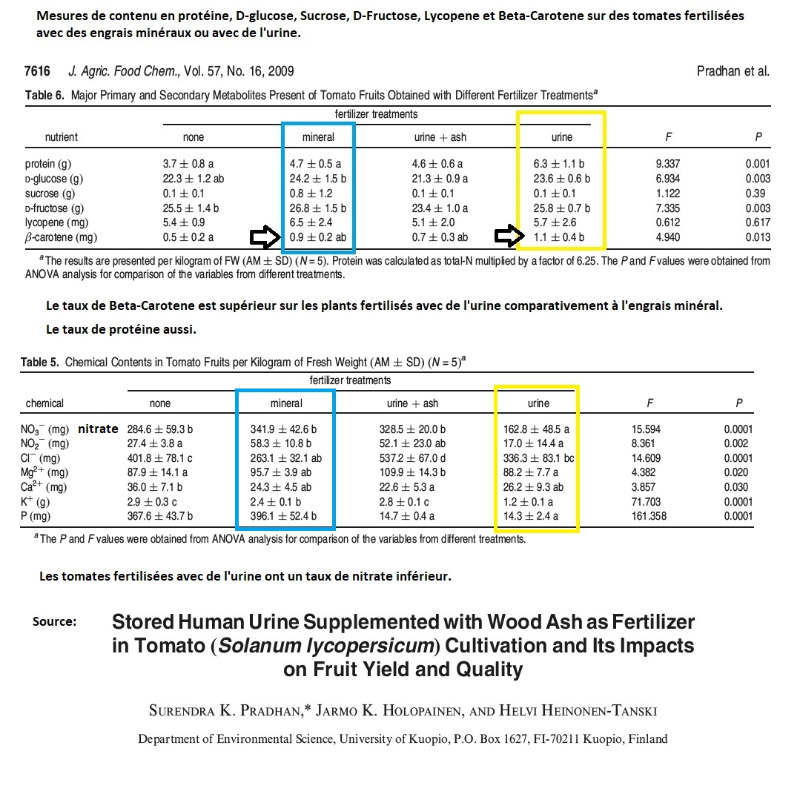 vitamines-...ates.jpg
(Filesize: 184KB)
vitamines-...ates.jpg
(Filesize: 184KB)
-
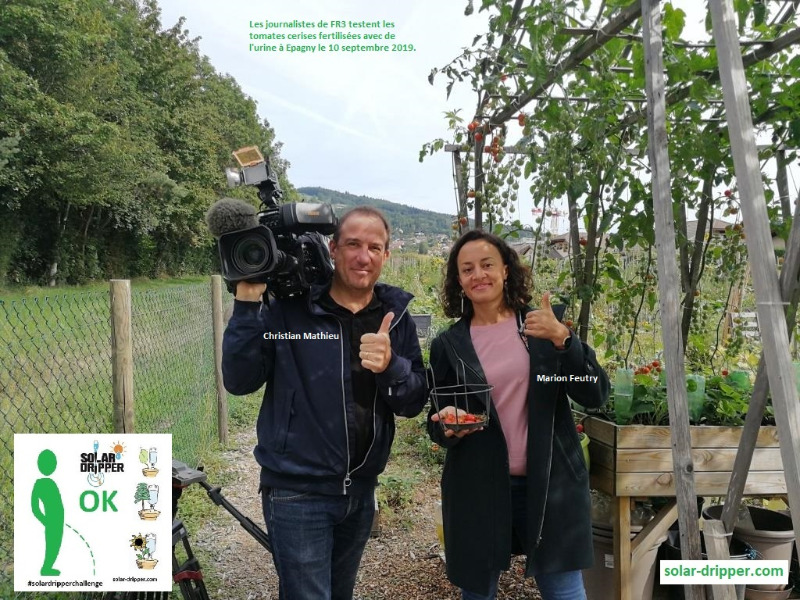 Journalist...2019.jpg
(Filesize: 234KB)
Journalist...2019.jpg
(Filesize: 234KB)
-
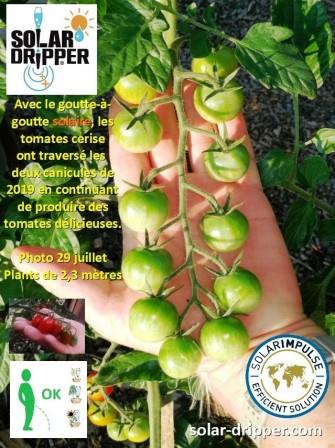 tomates-29-07-2_w.jpg
(Filesize: 40KB)
tomates-29-07-2_w.jpg
(Filesize: 40KB)
-
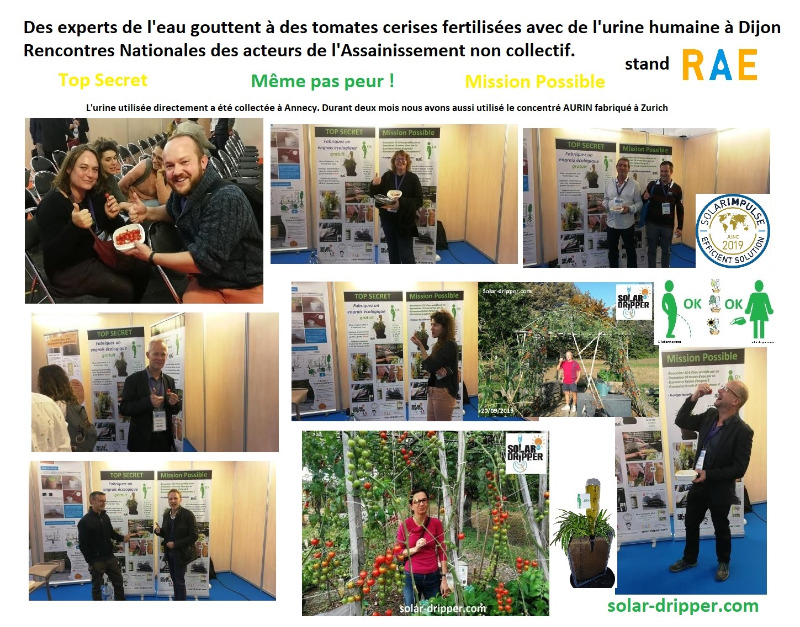 Salon-ANC-...1-26.jpg
(Filesize: 243KB)
Salon-ANC-...1-26.jpg
(Filesize: 243KB)
-
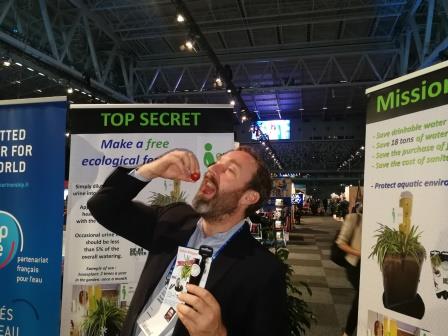 test-11.jpg
(Filesize: 38KB)
test-11.jpg
(Filesize: 38KB)
Please Log in to join the conversation.
You need to login to reply- Heiner
-
 Topic Author
Topic Author- I am a retired organic farmer and interested in nutrient cycles. As an volunteer I now travel mainly to poor countries and together with locals I would like to find new ways of sustainable agriculture. This is beyond the regulations of IFOAM.
Less- Posts: 80
- Karma: 1
- Likes received: 67
Re: The RUNRES project: Establishing a nutrient loop to improve city region food system resilience
Thanks Robert,
one day when I settle in the tropics....off grid..... I'll take your bottles . I'm sure it works in private garden but I still hope we can introduce it to politicians and authorities...
. I'm sure it works in private garden but I still hope we can introduce it to politicians and authorities...
Have a nice day,
Heiner
one day when I settle in the tropics....off grid..... I'll take your bottles
Have a nice day,
Heiner
Heiner, the old farmer.....
The following user(s) like this post: Robert74
Please Log in to join the conversation.
You need to login to replyRe: The RUNRES project: Establishing a nutrient loop to improve city region food system resilience
We have created a watering system called Solar-Dripper capable of using rainwater and unfiltered water. We have tested Urine with great succes for 2 years now and you can acces the method and son video on our web page : solar-dripper.com/en/how-to-use-urine-fertilizer/ The cost of the system is affordable and it last 5 - 10 years without filtration.
Robert Cossette
solar-dripper.com
solar-dripper.com
Attachments:
-
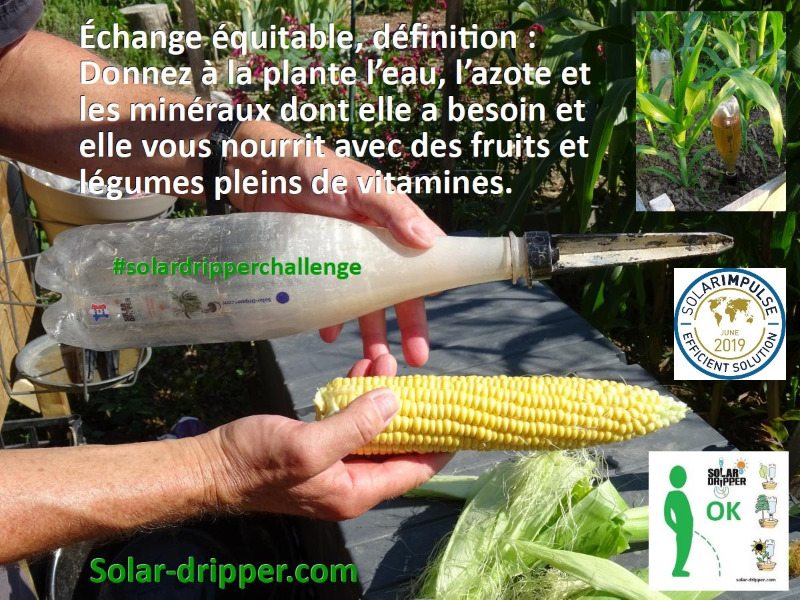 solardripp...able.jpg
(Filesize: 242KB)
solardripp...able.jpg
(Filesize: 242KB)
-
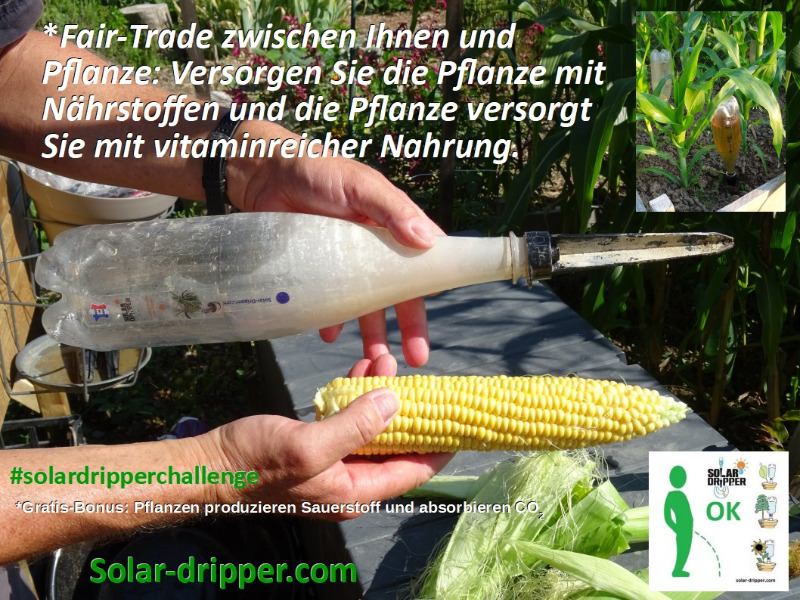 solardripp...-all.jpg
(Filesize: 246KB)
solardripp...-all.jpg
(Filesize: 246KB)
-
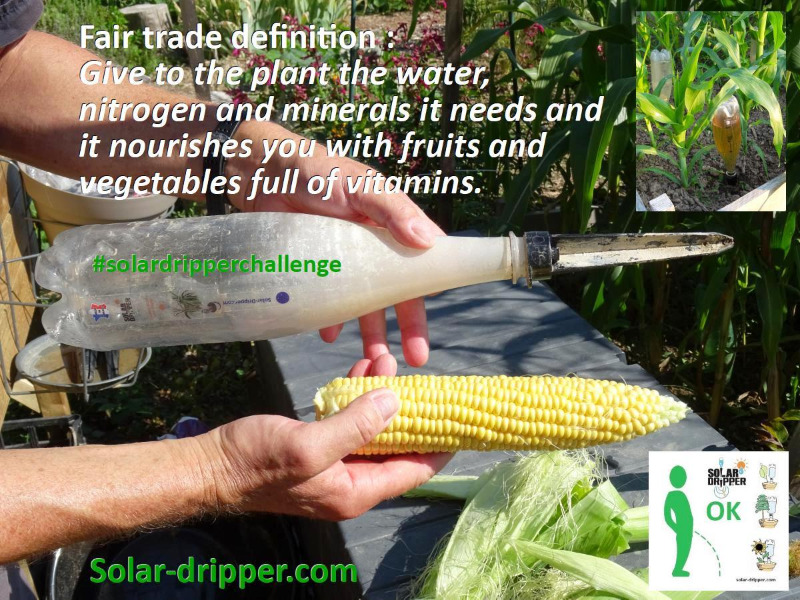 solardripp...rade.jpg
(Filesize: 239KB)
solardripp...rade.jpg
(Filesize: 239KB)
-
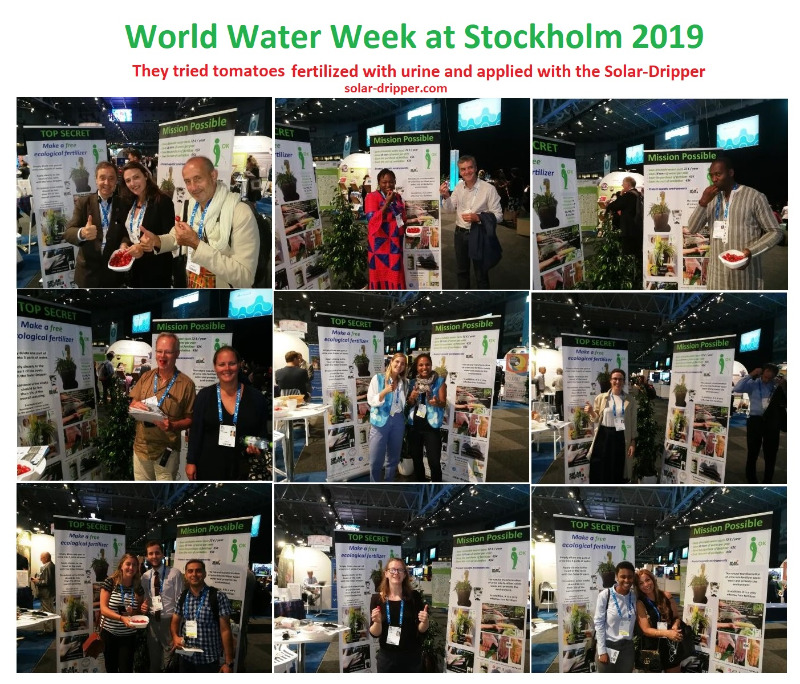 world-water-week.jpg
(Filesize: 284KB)
world-water-week.jpg
(Filesize: 284KB)
-
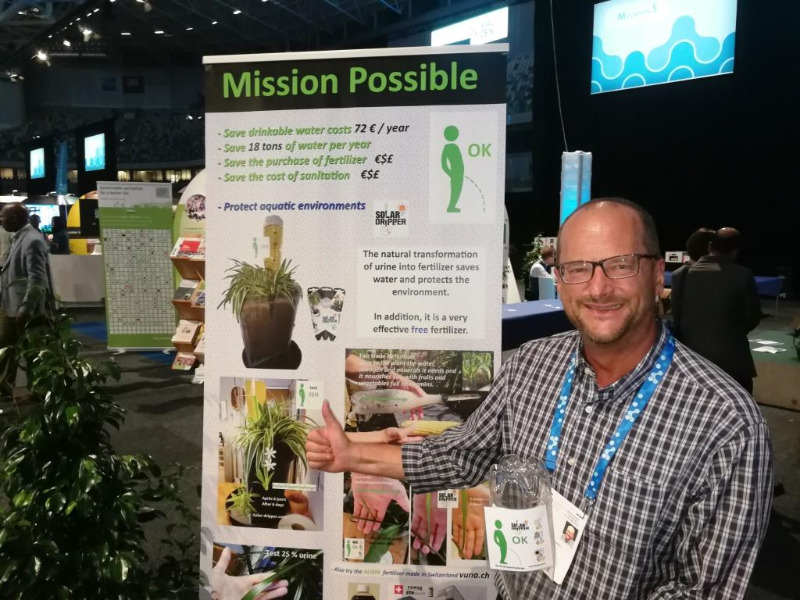 solar-dripper_www.jpg
(Filesize: 184KB)
solar-dripper_www.jpg
(Filesize: 184KB)
Please Log in to join the conversation.
You need to login to reply- Heiner
-
 Topic Author
Topic Author- I am a retired organic farmer and interested in nutrient cycles. As an volunteer I now travel mainly to poor countries and together with locals I would like to find new ways of sustainable agriculture. This is beyond the regulations of IFOAM.
Less- Posts: 80
- Karma: 1
- Likes received: 67
I remembered partly wrong:
edoc.hu-berlin.de/handle/18452/16426
See the Diss. of Andreas Muskolus.
As I read now in the summary he concentrated up in pot tests but states in the field there are no worries. But then I read in different posts about self supplying gardening...don't use in origin, dilute. But no scientific results, just experiences.
But the worms and some microbes were apparently shocked.
Me, as a farmer, I would try it of course. Did it with animal urine for decades.... Not on leaves in the sun....
In a little hurry,
Heiner
edoc.hu-berlin.de/handle/18452/16426
See the Diss. of Andreas Muskolus.
As I read now in the summary he concentrated up in pot tests but states in the field there are no worries. But then I read in different posts about self supplying gardening...don't use in origin, dilute. But no scientific results, just experiences.
But the worms and some microbes were apparently shocked.
Me, as a farmer, I would try it of course. Did it with animal urine for decades.... Not on leaves in the sun....
In a little hurry,
Heiner
Heiner, the old farmer.....
The following user(s) like this post: canaday, Robert74
Please Log in to join the conversation.
You need to login to reply- Elisabeth
-
- User is blocked
- Freelance consultant since 2012
Less- Posts: 3372
- Karma: 54
- Likes received: 932
Re: Urine can be recycled unprocessed in urban agriculture
Dear Heiner,
I am just wondering where you read this?:
We have many publications on this topic in the SuSanA library (288 to be precise). You can find them by applying the filter on "Filter by reuse type", then "urine":
www.susana.org/en/knowledge-hub/resource...title=&author=&year=
Here is by the way the video that you mentioned about urine reuse in China (Scott Chen's apple orchards): www.susana.org/en/knowledge-hub/resource...library/details/3190
And this one is an oldie but a goodie (also exists in Spanish and French):
Richert, A., Gensch, R., Jönsson, H., Stenström, T., Dagerskog, L. (2010). Practical guidance on the use of urine in crop production. Stockholm Environment Institute (SEI), Sweden
www.susana.org/en/knowledge-hub/resource.../library/details/757
Regards,
Elisabeth
I am just wondering where you read this?:
I don't think it's true. We have plenty of publications in the SuSanA library that explain how pure urine can be used in agriculture. Oh, wen you say "concentrated urine" do you mean more concentrated than when it leaves the human body? If you want to use urine as a fertiliser you can dilute it with water but you don't have to. Either way, never apply it onto the leaves but to the soil next to the plants (I am sure this is obvious to you, as a farmer).All I read up to now ist that people recommended not to use the concentrated urine. Even in agriculture some organics say that.
We have many publications on this topic in the SuSanA library (288 to be precise). You can find them by applying the filter on "Filter by reuse type", then "urine":
www.susana.org/en/knowledge-hub/resource...title=&author=&year=
Here is by the way the video that you mentioned about urine reuse in China (Scott Chen's apple orchards): www.susana.org/en/knowledge-hub/resource...library/details/3190
And this one is an oldie but a goodie (also exists in Spanish and French):
Richert, A., Gensch, R., Jönsson, H., Stenström, T., Dagerskog, L. (2010). Practical guidance on the use of urine in crop production. Stockholm Environment Institute (SEI), Sweden
www.susana.org/en/knowledge-hub/resource.../library/details/757
Regards,
Elisabeth
Dr. Elisabeth von Muench
Freelance consultant on environmental and climate projects
Freelance consultant on environmental and climate projects
The following user(s) like this post: canaday
Please Log in to join the conversation.
You need to login to reply- Heiner
-
 Topic Author
Topic Author- I am a retired organic farmer and interested in nutrient cycles. As an volunteer I now travel mainly to poor countries and together with locals I would like to find new ways of sustainable agriculture. This is beyond the regulations of IFOAM.
Less- Posts: 80
- Karma: 1
- Likes received: 67
Re: The RUNRES project: Establishing a nutrient loop to improve city region food system resilience
Hi, man in jungle..
first of all: respect for what you did und you are still doing!
I had a look at the map and, as you wrote, a lack of water is not your biggest problem..... Knowing that I understand your technology even better. In my thoughts irrigation and fertilising were connected and then you can't accept a hole is plugged or water runs in different amounts to different trees.
Where I discuss(ed) wastewater reuse or the use of urine we had/have 550, 250 or 800 mm rainfall per year. And depending on the average temperature there was a decent lack of water.
By using the concentraded urine you might really have the side-effect no root creeps into the pipe. Very true and perhaps important. Thats just experience and knowledge. During my career I had very often trouble with drainage systems, where roots of trees plugged the system by searching water or nutrients in low concentrated wastewater or rainwater.
How the microbes (e.g. Nitrosomonas, Nitrobacter) adapt to your system you will know by now. And if we look at nature we can see they do adapt. But years back I had a publication in my hand in which was stated concentrated urine poured on the ground shocks the life in the soil. Visible by watching the earthworms (can't remember the species) vanishing for a time. Though they recovered it was suggested to dilute. But in your case: they can stay away and get to the surface (at least lumbricus terrestis and his tropical mates) a meter away if they dislike. And dilution comes daily by the gods....
Have a nice day,
Heiner
first of all: respect for what you did und you are still doing!
I had a look at the map and, as you wrote, a lack of water is not your biggest problem..... Knowing that I understand your technology even better. In my thoughts irrigation and fertilising were connected and then you can't accept a hole is plugged or water runs in different amounts to different trees.
Where I discuss(ed) wastewater reuse or the use of urine we had/have 550, 250 or 800 mm rainfall per year. And depending on the average temperature there was a decent lack of water.
By using the concentraded urine you might really have the side-effect no root creeps into the pipe. Very true and perhaps important. Thats just experience and knowledge. During my career I had very often trouble with drainage systems, where roots of trees plugged the system by searching water or nutrients in low concentrated wastewater or rainwater.
How the microbes (e.g. Nitrosomonas, Nitrobacter) adapt to your system you will know by now. And if we look at nature we can see they do adapt. But years back I had a publication in my hand in which was stated concentrated urine poured on the ground shocks the life in the soil. Visible by watching the earthworms (can't remember the species) vanishing for a time. Though they recovered it was suggested to dilute. But in your case: they can stay away and get to the surface (at least lumbricus terrestis and his tropical mates) a meter away if they dislike. And dilution comes daily by the gods....
Have a nice day,
Heiner
Heiner, the old farmer.....
The following user(s) like this post: canaday
Please Log in to join the conversation.
You need to login to replyRe: The RUNRES project: Establishing a nutrient loop to improve city region food system resilience
Hi Heiner,
One could do more detailed follow-up, but we have not had trouble with these perforated hoses that have been in use for years (as long as one does not use standard hose connectors which constrict the flow at those points).
I imagine that individual holes (lollypop sticks) may get plugged with struvite, etc., but then the urine exits other holes until these plugs decompose.
Also, since these hoses are so inexpensive, if one gets plugged, it can be replaced and the old hose can be pulled out and cleaned the next year, after any disease microbes are long dead.
It is important to visualize this as a steady-state situation, with small amounts of urine being dispersed in the soil daily, the microbes that process the urine getting well populated, and the plants putting their roots as close as they "like". I think the pure urine is too concentrated for the plant roots and this keeps them from plugging the holes. This is very different from applying larger amounts of urine all of a sudden and taking the microbes and plants by surprise.
Urine gets diluted spacially and we do have to make sure that there is enough water in the soil. This is the least of our worries here in the rainy Amazon.
Burying the hose under 10 cm of soil largely eliminates the risk of fecal contamination of the urine, keeps people from damaging the hose with machetes when weeding, and prevents rainforest mammals from chewing up the hose to get to those valuable nutrients.
I encourage more detailed studies to be done on this.
Best wishes,
Chris
One could do more detailed follow-up, but we have not had trouble with these perforated hoses that have been in use for years (as long as one does not use standard hose connectors which constrict the flow at those points).
I imagine that individual holes (lollypop sticks) may get plugged with struvite, etc., but then the urine exits other holes until these plugs decompose.
Also, since these hoses are so inexpensive, if one gets plugged, it can be replaced and the old hose can be pulled out and cleaned the next year, after any disease microbes are long dead.
It is important to visualize this as a steady-state situation, with small amounts of urine being dispersed in the soil daily, the microbes that process the urine getting well populated, and the plants putting their roots as close as they "like". I think the pure urine is too concentrated for the plant roots and this keeps them from plugging the holes. This is very different from applying larger amounts of urine all of a sudden and taking the microbes and plants by surprise.
Urine gets diluted spacially and we do have to make sure that there is enough water in the soil. This is the least of our worries here in the rainy Amazon.
Burying the hose under 10 cm of soil largely eliminates the risk of fecal contamination of the urine, keeps people from damaging the hose with machetes when weeding, and prevents rainforest mammals from chewing up the hose to get to those valuable nutrients.
I encourage more detailed studies to be done on this.
Best wishes,
Chris
Conservation Biologist and EcoSan Promoter
Omaere Ethnobotanical Park
Puyo, Pastaza, Ecuador, South America
inodoroseco.blogspot.com
Omaere Ethnobotanical Park
Puyo, Pastaza, Ecuador, South America
inodoroseco.blogspot.com
The following user(s) like this post: HarryTams
Please Log in to join the conversation.
You need to login to reply- Heiner
-
 Topic Author
Topic Author- I am a retired organic farmer and interested in nutrient cycles. As an volunteer I now travel mainly to poor countries and together with locals I would like to find new ways of sustainable agriculture. This is beyond the regulations of IFOAM.
Less- Posts: 80
- Karma: 1
- Likes received: 67
Re: The RUNRES project: Establishing a nutrient loop to improve city region food system resilience
Hi Chris,
sounds very appropriate to a situation. I like the idea to use little or no technic. It breaks down anyway.
But if you scale that a little up or if the trees are uphill you will need a little pump, I guess.
How can one prevent the crystallisation of the minerals? By dilution? The idea cleaning the lollipops from time to time is not that attracting or is at a hazard in an area where e.g. HIV is widespread. My friend here (Gynaecologist)at home just told me. So if you dilute and can put pressure on the pipe....can you blast ist?
All I read up to now ist that people recommended not to use the concentrated urine. Even in agriculture some organics say that. But if you drip it underground it must be easy to find out if the plants like it or not. When the roots start to rotten next to to the dripping area, the concentration might be too high. If the roots grow well...well done. Did you ever check that?
Thanks so far and have a nice day,
Heiner
sounds very appropriate to a situation. I like the idea to use little or no technic. It breaks down anyway.
But if you scale that a little up or if the trees are uphill you will need a little pump, I guess.
How can one prevent the crystallisation of the minerals? By dilution? The idea cleaning the lollipops from time to time is not that attracting or is at a hazard in an area where e.g. HIV is widespread. My friend here (Gynaecologist)at home just told me. So if you dilute and can put pressure on the pipe....can you blast ist?
All I read up to now ist that people recommended not to use the concentrated urine. Even in agriculture some organics say that. But if you drip it underground it must be easy to find out if the plants like it or not. When the roots start to rotten next to to the dripping area, the concentration might be too high. If the roots grow well...well done. Did you ever check that?
Thanks so far and have a nice day,
Heiner
Heiner, the old farmer.....
Please Log in to join the conversation.
You need to login to replyRe: The RUNRES project: Establishing a nutrient loop to improve city region food system resilience
Dear Heiner,
I use the cheapest hoses that are available, which here in Ecuador are the 1/2-inch black hoses that are used in construction for electrical conduits, with tiny 1-2mm holes every 50cm. One technique is to cut sections of plastic lollypop sticks (which are actually tiny pipes) and insert these into the hose. This is not drip irrigation, as the drip points may plug with struvite or something. Ben Clouet did, however, filter urine in Cambodia and then do drip irrigation.
The urine distributes itself by gravity to below the surface of the soil and this occurs each time someone pees.
Best wishes,
Chris Canaday
I use the cheapest hoses that are available, which here in Ecuador are the 1/2-inch black hoses that are used in construction for electrical conduits, with tiny 1-2mm holes every 50cm. One technique is to cut sections of plastic lollypop sticks (which are actually tiny pipes) and insert these into the hose. This is not drip irrigation, as the drip points may plug with struvite or something. Ben Clouet did, however, filter urine in Cambodia and then do drip irrigation.
The urine distributes itself by gravity to below the surface of the soil and this occurs each time someone pees.
Best wishes,
Chris Canaday
Conservation Biologist and EcoSan Promoter
Omaere Ethnobotanical Park
Puyo, Pastaza, Ecuador, South America
inodoroseco.blogspot.com
Omaere Ethnobotanical Park
Puyo, Pastaza, Ecuador, South America
inodoroseco.blogspot.com
Please Log in to join the conversation.
You need to login to reply- Heiner
-
 Topic Author
Topic Author- I am a retired organic farmer and interested in nutrient cycles. As an volunteer I now travel mainly to poor countries and together with locals I would like to find new ways of sustainable agriculture. This is beyond the regulations of IFOAM.
Less- Posts: 80
- Karma: 1
- Likes received: 67
The RUNRES project: Establishing a nutrient loop to improve city region food system resilience
Note by moderator: The discussion began here in this other thread: forum.susana.org/17-fertiliser-soil-cond...tem-resilience#28227
++++++++
Dear Chris (Canaday)
I just bumped in here, so we don't know each other up to now. As a farmer I'm always attracted to a text when the word fertiliser is written...Working on organic farms for over 30 years nutrient shortage and low productivity were always the guys right beside me.
Urine is the fertiliser and your idea with the banana plants sounds great to me. Should work with different fruit trees (just remember a TV documentation where they did it in China in an orchard). Perhaps you could design windbreaks with some fruit trees in-between. Mulch and food, depending on the climate.
Using a hose or a pipe...is it a on/off system or can you imagine a driple irrigation when the substrate is dilutet and filtert well?
Regards,
Heiner
++++++++
Dear Chris (Canaday)
I just bumped in here, so we don't know each other up to now. As a farmer I'm always attracted to a text when the word fertiliser is written...Working on organic farms for over 30 years nutrient shortage and low productivity were always the guys right beside me.
Urine is the fertiliser and your idea with the banana plants sounds great to me. Should work with different fruit trees (just remember a TV documentation where they did it in China in an orchard). Perhaps you could design windbreaks with some fruit trees in-between. Mulch and food, depending on the climate.
Using a hose or a pipe...is it a on/off system or can you imagine a driple irrigation when the substrate is dilutet and filtert well?
Regards,
Heiner
Heiner, the old farmer.....
Please Log in to join the conversation.
You need to login to reply
Share this thread:
- Forum
- categories
- Resource recovery
- Fertiliser, soil conditioner, production of crops
- Urine reuse or infiltration
- Urine can be recycled unprocessed in urban agriculture
Recently active users. Who else has been active?
Time to create page: 0.167 seconds








